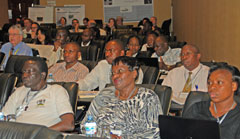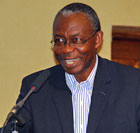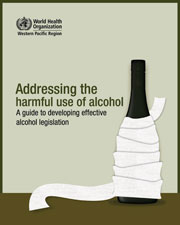
First African KBS meeting for alcohol researchers held in Uganda
"The price we are paying for the drinking culture in Africa today is that we loose many of our young people", said Professor Isidore Obot (Nigeria) in his overview of the African situation at the KBS meeting in Kampala, Uganda.

Alcohol is a considerable burden on the health and welfare of many Africans, a fact that was reported from many of the countries present at the meeting. However, data are missing, and there is an urgent need to produce more documentation to show the size of the problem and how drinking problems are dispersed in regions, countries, genders, age groups and socio-economic groups.
Around 140 participants attended the conference in Uganda, representing 22 countries. More than 100 participants were from African countries. The conference was hosted by the Makerere University School of Public Health in Kampala, together with the Kettil Bruun Society.
Here is the website of the KBS meeting and here you can download presentations held at the meeting.
Towards the end of the conference Professor Isidore Obot from the Centre for Research and Information on Substance Abuse (CRISA) in Nigeria gave an overview of the alcohol problem in Africa, based on available data. These were some of the facts that were highlighted by Professor Obot:
- The consumption level in Africa is at par with the global average, 6.2 litres of alcohol per capita per year.
- Half of the consumed alcohol is unrecorded beverages.
- Most countries in Africa has a high proportion of non-drinkers in their population; more than 50 % as an average for the whole continent.
- This means that those who drink have a very high and very risky consumption level, ranging from around 20 to 40 litres per person. These high levels are in particular found among men.
- Drinking causes many intentional and unintentional injuries (accidents, traffic fatalities, violence, fights) and such harm is in particular prevalent among young men.

The high rate of non-drinkers in African countries was mentioned as an important policy issue in a number of presentations. This fact reduces the overall consumption in African countries, and as such the level of harm. It should therefore be a concern of high priority for politicians to keep the proportion of non-drinkers high in Africa. This will also reduce the social pressure towards drinking.
In her closing statement Professor Moira Plant from the UK used the experiences from European countries to sound a warning bell: “African countries should have policies to avoid that drinking becomes a norm, especially among the youth”. She also pointed at the gender dimensions of alcohol use. “Men are normally the heavy drinkers, while women often are non-drinkers. It has long been the role of women to control and balance men’s drinking. What will happen to alcohol consumption and alcohol-related harm in Africa if women become drinkers at the same level as men?” Professor Plant asked.
During the conference three features stood out as critical on the African alcohol arena:
- There is a lack of alcohol policies in most African countries.
- In many countries existing legislation is not enforced or only weakly enforced.
- The behaviour of the alcohol industry is aggressive, both in the policy field and in the market place.
Project Manager Øystein Bakke from FORUT Norway pointed in his presentation to the policy initiatives taken by the alcohol industry in at least 7-8 African countries. Draft policies have been made for such number of countries through what has been said has been consultative processes between NGOs, government agencies and industry. “In spite of this the available drafts have turned out to be more or less identical from one country to the other, down to individual sentences”, said Øystein Bakke. He said that the policy drafts were biased towards liberty for the alcohol industry and in securing a place of the vested interests in alcohol policy formulation.
Wim van Dalen from STAP in The Netherlands presented the MAMPA project: Monitoring of Alcohol Marketing Practises in Africa. This project has documented the marketing practises of beer and liquor companies in Nigeria, Uganda, The Gambia and Ghana. The MAMPA report identified the following key messages in the marketing campaigns of alcohol producers in the countries of the study: Drinking alcohol to be successful in life, Drinking alcohol to be a sports hero and to be a good fan, Drinking the brand is part of your tradition and culture, Alcohol producers contribute to a better world.
The Gambia stood out as different from the three other countries with an alcohol marketing regulatory framework which is more stringent and established by law. For Nigeria, Uganda and Ghana the MAMPA project documented that “alcohol producers have a lot of freedom in alcohol marketing activities due to a limited or absent alcohol marketing policy in the countries participating”. Large amounts of marketing activities were found, and “the size, frequency and placement of alcohol advertisements and sponsorship of alcohol marketing in Ghana, Nigeria and Uganda are aimed at reaching large audiences”.
Following the KBS meeting FORUT and Blue Cross organized a workshop with the purpose of discussing to what extent the existing evidence-base of effective interventions is relevant for Africa. It was also discussed how more documentation from an African setting could be produced and how researchers and NGOs could collaborate in defining needs for more research.
![]()
![]()
Developed with CustomPublish CMS by Nettinfo AS


